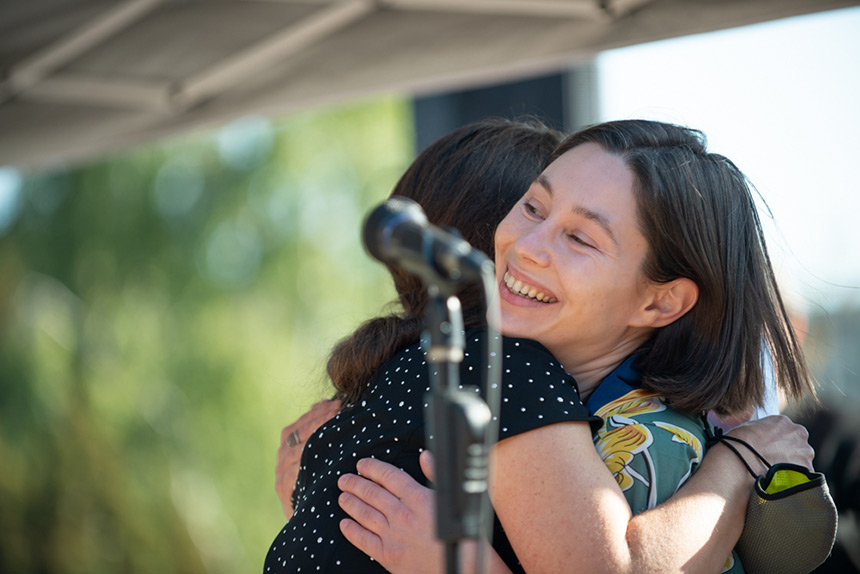
By Andrew Cohen and Sarah Weld
To win a top public service-oriented award is special at any school. At Berkeley Law, it’s a colossal achievement.
After all, the school has more than 40 Student-Initiated Legal Services Projects, roughly 95% of J.D. students participate in pro bono work before graduating, and students collectively put in around 30,000 hours of such work each year to help disadvantaged clients and communities.
To stand out among all that individual and collective commitment is no small feat. The students and faculty honored below have exhibited tremendous resolve and relentless dedication to working across the legal landscape to improve people’s lives.
Pro Bono Champion Award (given to graduating students who best exemplify a commitment to and the values of pro bono work):
Sam Sokolsky ’22
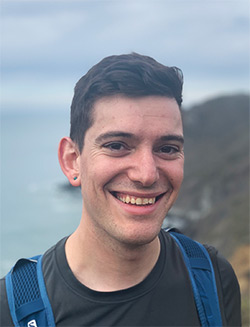
Sokolsky completed a whopping 600 pro bono hours in law school, volunteering with the Consumer Rights Workshop, Public Law Center, Reproductive Justice Project, and leading a Berkeley Law Alternative Service Trip (Central Valley). He readied clients for their hearings in small claims court, drafted persuasive demand letters, wrote detailed trial and appellate briefs, helped immigrant detainees applying for humanitarian parole, and aided Afghan refugees. His nomination touted advocacy that “surpassed the narrow confines of the legal case to helping clients with every aspect of moving their lives forward.”
Sokolsky says: “Pro bono work has given me the most rewarding experiences at Berkeley Law. More than anything, it has shown me the honor and responsibility that comes with being entrusted to work on a client’s case, and how everyone with a legal education has the responsibility to help close the justice gap for underserved clients. Working in immigrantion law for the past three years has highlighted the decades of broken promises to immigrant communities — and how the injustices that comprise the American immigration system require all attorneys to use their tools to fight this injustice if we are to have hope of a more just system.”
Brian M. Sax ’69 Prize for Excellence in Clinical Advocacy (given to a clinic student who displayed excellence in advocacy, professional judgment, collaboration, and reflection):
Sarah Abelow ’22
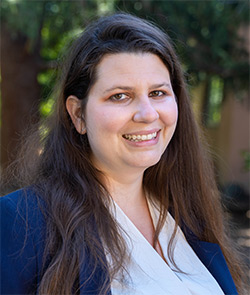
At the East Bay Community Law Center’s Health & Welfare Clinic, Abelow advocated alongside her clients with deep humility and integrity. In particular, she worked on cases with mothers who can’t work outside the home because they care for their children with disabilities. As well as helping clients directly, Abelow assisted with policy advocacy and served on the Center’s board of directors. In the International Human Rights Law Clinic, she contributed to Who Will Be Left to Defend Human Rights?, a report on government persecution of human rights activists in the Gulf region.
Abelow says: “Participating in law school clinics has helped me understand some of the many ways I can use the knowledge, skills, and privilege I have as a future lawyer to support our community and contribute to building a more just world. My clinic experiences have shown me how to honor the expertise and experiences of our clients as we advocate in their cases, as well as how we can play a supporting role in the fight for gender, racial, economic, and disability justice.”
Clinical Legal Education Association Outstanding Clinical Student Award (given to one student or team that demonstrated excellence in a clinic) and Brian M. Sax ’69 Sax Prize for Excellence in Clinical Advocacy Honorable Mention:
Kaylee Johnson ’22
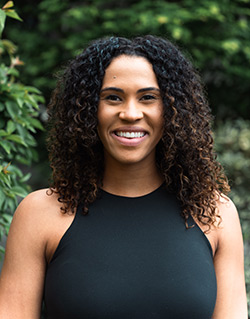
In the Death Penalty Clinic, Johnson worked tirelessly on the case of Toforest Johnson, an innocent client on Alabama’s death row whom the clinic has represented for almost two decades. She drafted and executed investigation plans, interviewed the client and witnesses in Alabama, and led team strategy discussions. A fellow clinic student described her as “absolutely, stunningly brilliant.” Her nomination called her a natural leader with high standards, who has the vision to advance the client’s goals and the work ethic to get the job done and inspire her peers.
Johnson says: “The Death Penalty Clinic has been more rewarding than I ever imagined and one of the most pivotal experiences in my life. This experience has taught me how to lawyer creatively and traditionally, and what being an advocate to our client means, how to balance moments of joy and excitement with moments of hopelessness and ultimately how to persevere through these times, and how to manage expectations and redefine success. It has had a lasting impact on my legal education and, more importantly, my life.”
Francine Diaz Memorial Award (given to a graduating student whose studies and career plans best reflect Diaz’s commitment to social justice for women of color):
Tiffany DeGuzman ’22 and Elaria Youssef ’22
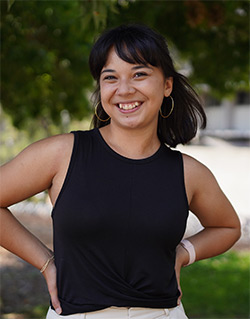
DeGuzman confronted environmental issues outside law school for the National Resource Defense Center and Earthjustice, and inside it for the Environmental Law Clinic. As a 3L, she worked at Altshuler Berzon, a local firm that litigates for economic justice and the public interest. She also helped lead Berkeley Law’s Food Justice Project and Pilipinx American Law Society, was a researcher for its Human Rights Center, and served as public interest chair for First Generation Professionals. As senior articles editor for the California Law Review, she and her team published an issue featuring articles written entirely by Black scholars on important critical race issues.
DeGuzman says: “I came to Berkeley Law in search of a strong public interest community, and I found exactly what I was searching for, plus so much more. I am so grateful that I have been able to do pro bono work and/or public interest internships during every semester of law school. This work has helped me never lose sight of why I came to law school, and I know I will be entering my career more prepared to serve my clients because of these experiences. Thanks to the pro bono and public interest community at Berkeley Law, I am a better writer, a more creative thinker, and a more compassionate human being.”
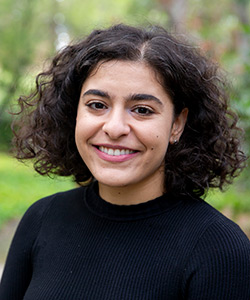
Youssef co-led the International Refugee Assistance Project, and her efforts providing support to those seeking entry to the U.S. helped Berkeley win a chapter award from the organization. During the summer 2020 uprisings, Youssef returned home to Bakersfield and worked with the National Lawyers Guild to secure legal representation for incarcerated protestors. While participating in EBCLC’s Clean Slate Clinic and Death Penalty Clinic, she co-founded the DA Accountability and Participatory Defense Project, a new SLP that supports the Urban Peace Movement’s court watch and participatory defense efforts.
Youssef says: “I grew up with an understanding that justice is defined by accountability, healing, and growth; yet as I was increasingly exposed to the criminal legal system, I witnessed how the system conflates ‘justice’ with punishment and isolation. Abolition is not merely about dismantling oppressive institutions — it’s about redefining and rebuilding a society oriented toward collective, community care. The organizers I have worked with at the Urban Peace Movement are the most compassionate, loving, and fearless people I’ve come to know. As I transition into my career as a public defender, I hope to emulate these qualities as I adapt to the role of a lawyer within the movement that is needed from my community.”
Eleanor Swift Award for Public Service (given to an exceptional member of the Berkeley Law community who, like Professor Swift, has performed outstanding work to strengthen the school’s commitment to public service):
Professor Lucinda Sikes (posthumously) and Sara Jaramillo ’22
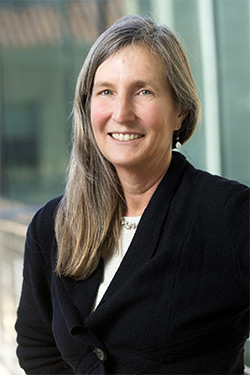
A professor of legal writing at Berkeley Law for 20 years before her tragic death in 2021, Sikes used her broad preceding experience as a public interest lawyer to guide and mentor students. That formative background shaped how she crafted legal problems for her courses, and helped motivate scores of students to follow in her public interest footsteps through externships, Student-Initiated Legal Services Projects, clinics, pro bono efforts, and long-term careers. Outside of the law school, Sikes served as a board member for the CALPIRG Education Fund, the Consumers for Auto Reliability and Safety, and the Consumer Federation of California.
Hadley Rood ’22 says: “Professor Sikes shaped my 1L year and informed my path toward working in social justice after graduation. She told incredible, engaging stories about her experiences working in public interest that inspired me to want to do the same … I could tell she wanted the best for me — for all of us — and wanted to support us on our path through law school and beyond. She was giving and always brightened our days; she embodied the values of public interest lawyering. I am grateful to have been her student.”
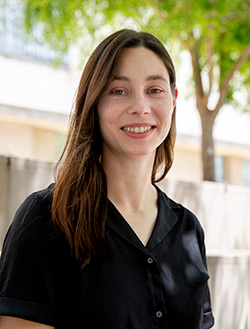
Jaramillo co-led a Berkeley Law Alternative Service Trip in Fresno and co-led Students for Economic and Environmental Justice, organizing 25 students to submit several dozen claims for people experiencing homelessness whose shelters and possessions were taken by Caltrans. She also helped write an International Human Rights Law Clinic working paper on how a San Francisco truth commission could best address police violence against African Americans, co-wrote an amicus brief to the Inter-American Court on Human Rights on surveillance of Colombian human rights activists, and planned a Berkeley La Raza Law Journal symposium called “Why Xenophobia?”
Jaramillo says: “What I’ve loved about my time at Berkeley was the freedom to work in so many fields, because injustice exists everywhere. My three semesters with the International Human Rights Law Clinic gave me a new language with which to understand state responsibility, continuing legacies of colonialism, and the incredible resistance embodied by communities around the world. At the same time, Berkeley gave me the chance to apply those lessons locally. Despite the magnitude of the challenges before us, the experience and community I’ve gained at Berkeley are a huge part of what keeps me going.”
Kathi Pugh ’90 Award for Exceptional Mentorship (given to outstanding supervising attorneys of Berkeley Law’s Student-Initiated Legal Services Projects for their outstanding efforts to encourage, mentor, and supervise our law students engaged in pro bono work):
Olivia Cole and Rose Carmen Goldberg, Legal Obstacles Veterans Encounter; DeCarol Davis ’17, Workers’ Rights Clinic
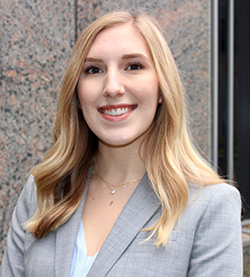
Cole identified several advocacy avenues for Legal Obstacles Veterans Encounter (LOVE), a new student-led legal services project. She led training on the Department of Defense discharge upgrade process (which can allow veterans with a “bad paper” discharge to receive benefits). Cole also coordinated monthly intake clinics with veterans in support of Swords to Plowshares. Teaching the school’s Veterans Law Practicum, she trains students to provide vital legal services and helps them network with veterans advocates and service organizations.
Cole says: “I know firsthand how important pro bono opportunities are for students from an educational perspective, and how powerful student advocacy can be in helping meet the often overwhelming need for legal services when resources are scarce. Through my supervision I aim to help students develop core lawyering skills that they will continue to utilize in their legal practices going forward, and to impart the meaningful impact that we as advocates can have through pro bono engagement. Working with Berkeley’s law students has not only been personally rewarding, but also extremely beneficial for Swords to Plowshares and the veteran clients we serve.”
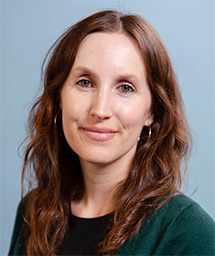
A California Deputy Attorney General and Berkeley Law lecturer who helped reinvigorate the Veterans Law Practicum, Goldberg oversaw LOVE’s inaugural project, steering production of a self-help guide for elderly veterans navigating a complex bureaucracy and guiding project leaders through the editing process. She has also trained students to support veterans with possible trauma during the intake sessions, connected the group with the ACLU to conduct research on deported veterans’ issues, and regularly provided mentoring and career advice — keeping LOVE students abreast of opportunities for public service or veterans pro bono work.
Goldberg says: “Receiving the Kathi Pugh Award is a special honor to me. As is widely known, Kathi Pugh was firmwide pro bono counsel for Morrison & Foerster. And under Kathi’s leadership, my family received outstanding pro bono representation from Morrison & Foerster for decades. This assistance means the world to me and my family, as I know the LOVE students’ work does to all the veterans they help.”
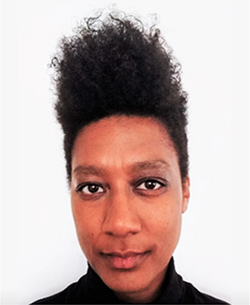
Overseeing students at the Workers’ Rights Clinic, Davis often stays well after the weekly sessions conclude, for the benefit of students and clients alike. She arranges a weekly guest speaker series on employment and labor law topics, illuminates legal issues, encourages independent thinking, and ensures that students have the needed information and language to offer clients sound legal advice. Davis also provides opportunities to become more involved in cases where additional follow-up is needed, or where Legal Aid at Work opts to give a client additional services. Students routinely point to the Workers’ Rights Clinic as one of the highlights of their law school experience.
Davis says: “Pro bono work is not some cute thing we should do on the side, if we happen to have the time; it is our duty. Kathi Pugh, in her excellence, showed us that pro bono work is our responsibility, and I hope to have passed the same resolve on to my students.”
View more photos of the Pro Bono and Public Interest Awards event.